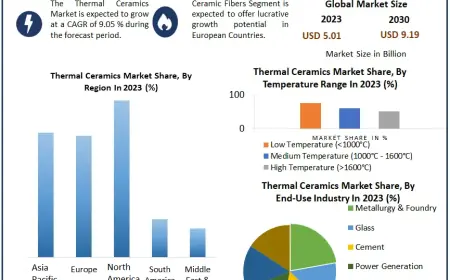Global Eczema Therapeutics Market to Reach USD 43.41 Billion by 2030, Driven by Advances in Biologic Treatments and Increased Awareness
The global eczema therapeutics market is expected to reach USD 43.41 billion in 2030, with a CAGR of 10.12% during the forecast period 2023-2030.

The Infinium Global Research analyzes the Eczema Therapeutics Market over the period of 2023 to 2030. This report also provides detailed qualitative and quantitative analyses of the market dynamics, market size and future trends in global eczema therapeutics market. It will help a lot of decision makers to develop strategies and find new opportunities in the global markets of eczema therapeutics. The report covers market changing aspects including drivers, restraints, opportunities, and trends expected to encouragement the expansion of the eczema therapeutics market during the period.
The global eczema therapeutics market is expected to reach USD 43.41 billion in 2030, with a CAGR of 10.12% during the forecast period 2023-2030.
Get Sample pages of Report: https://www.infiniumglobalresearch.com/form/416?name=Sample
Eczema Therapeutics Market: Key Drivers and Trends
This report dives deep into the Eczema Therapeutics market, exploring the major forces propelling its growth on a global and regional scale. It provides forecasts for market size (both value and segmented breakdowns), analyzes regional market positions, and identifies promising growth opportunities by country. Additionally, you'll find insightful profiles of key companies, complete with SWOT analyses to understand their strengths, weaknesses, opportunities, and threats.
The report offers a well-rounded perspective on market size, considering both historical data, current trends, and future projections. It examines the market from both the supply and demand angles, providing a comprehensive picture.
Thriving on Innovation: The Eczema Therapeutics Market
Eczema, a chronic inflammatory skin condition, plagues millions globally. This translates to a booming market for eczema therapeutics, encompassing topical creams, oral medications, and next-generation biologics. This market thrives on innovation, with pharmaceutical companies vying to develop more effective treatments and improve the quality of life for eczema sufferers.
Fueling Growth: Rising Demand and R&D
The increasing prevalence of eczema fuels market growth. This growing consumer base presents a lucrative opportunity for companies. Additionally, increased R&D efforts are expected to introduce groundbreaking therapies, catering to unmet medical needs and expanding treatment options. Imagine a future with personalized eczema treatments tailored to individual needs!
Challenges and Opportunities:
However, navigating regulatory hurdles and clinical trial failures can hinder market growth. Nonetheless, positive developments like expanding reimbursement policies and a robust medical infrastructure offer immense future potential.
Regional Analysis:
· North America is expected to dominate the eczema therapeutics market, boasting a strong combination of advanced healthcare infrastructure, a powerful pharmaceutical industry, and high healthcare spending. This, coupled with their focus on R&D, makes them a prime market for eczema treatments.
· Europe, however, is projected to experience the fastest growth. This surge is driven by an increase in research activities and institutes dedicated to developing new eczema treatments. Additionally, growing awareness of these advancements is expected to further fuel the European market.
· The Asia Pacific region also holds promise. While not the leader currently, their market is anticipated to grow steadily due to factors like increasing disposable income and a focus on improving healthcare infrastructure.
Market Segmentation
· By Drug Class: This segment breaks down the market by the types of medications used, such as calcineurin inhibitors, PDE4 inhibitors, and corticosteroids.
· By Disease Indication: This segment focuses on the specific eczema conditions the treatments target, primarily atopic dermatitis and contact dermatitis.
· By Distribution Channel: This segment explores how eczema medications reach patients, including hospital pharmacies, retail pharmacies, and online platforms.
Competitive Landscape
The eczema therapeutics market is a competitive landscape with several major players:
- Established Pharmaceutical Giants: This list includes companies like Pfizer, AstraZeneca, GSK, Sanofi, Novartis, and AbbVie. These are well-known pharmaceutical companies with a broad range of healthcare products, including potentially some eczema treatments.
- Emerging Players: Companies like Encore Dermatology and Regeneron Pharmaceuticals are focused on specific therapeutic areas, with eczema potentially being one of them. They might be developing innovative treatments or have a growing presence in this market segment.
- Acquisition Activity: The inclusion of Meda AB (acquired by Mylan) highlights the dynamic nature of the market. Mergers and acquisitions can significantly impact market share and development efforts.
This list provides a snapshot of some key companies involved in the eczema therapeutics market, but it's not exhaustive. There are likely other smaller firms and research institutions also contributing to advancements in this field.
Report Overview: https://www.infiniumglobalresearch.com/market-reports/global-eczema-therapeutics-market
Future Outlook:
The eczema therapeutics market is poised for growth due to rising eczema cases and increasing R&D efforts for innovative treatments. While regulatory hurdles may slow progress, improved reimbursement policies and advanced medical infrastructure point to a bright future for this market.
Conclusion:
The eczema therapeutics market is poised for continued expansion. Driven by rising demand, a focus on innovation, and increasing access to treatment, the future looks bright for advancements in eczema management and improved quality of life for patients.
What's Your Reaction?
 Like
0
Like
0
 Dislike
0
Dislike
0
 Love
0
Love
0
 Funny
0
Funny
0
 Angry
0
Angry
0
 Sad
0
Sad
0
 Wow
0
Wow
0













































